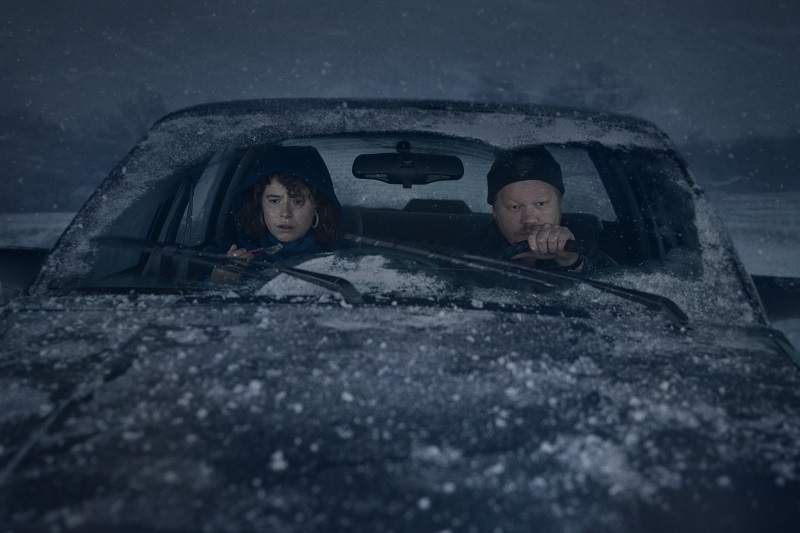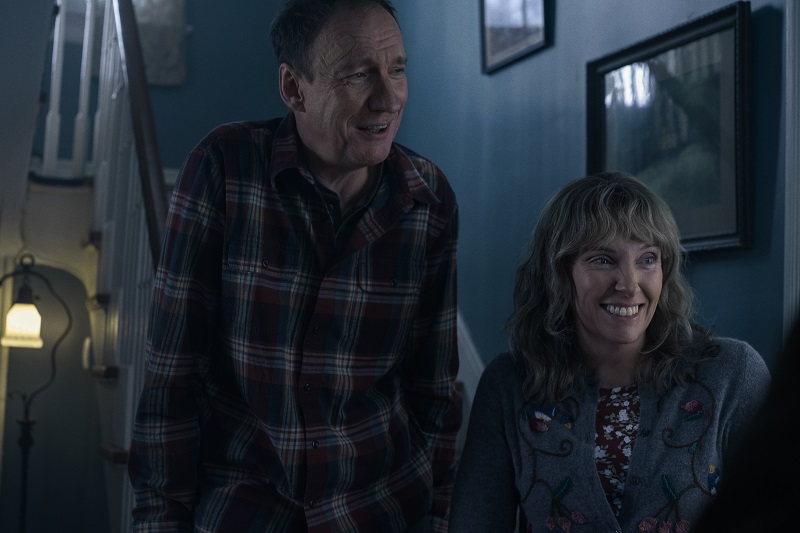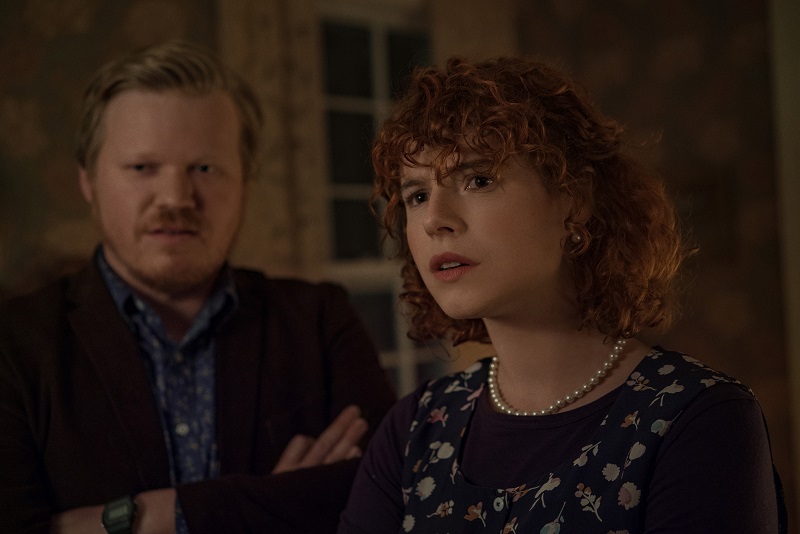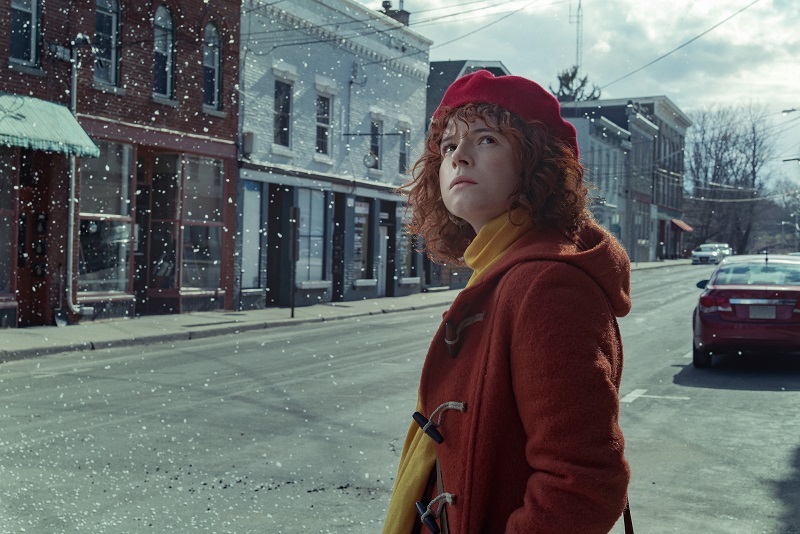The bringing of Iain Reid’s novel I’m Thinking of Ending Things to the screen by auteur Charlie Kaufman is a match made in heaven. The first thing that struck me was that the latest from the man who wrote Being John Malkovich feels like you’re watching a novel. It is not simply the adaptation (also a title of one of Kaufman’s films!) of the source material that gives off this richness one enjoys when the eyes go through sentence after sentence, page after page, and you get lost in the lush literary majesty.

The wordplay and prose scream literature. Over the years, Kaufman has established himself as the most unique of writers and not solely from his subject matters and plotlines—that can come off to those not expecting it, as quite odd—but there is firmly something Kaufmanian about his films. When you are witnessing a Charlie Kaufman movie, you know it. Instantly.
By adapting Reid’s beloved book, the two writers have formed a talent tandem that is a magnificent meeting of the like-minded minds. The filmmaker is a maestro of what some may call “out there” cinema,” who is no stranger to non-linear narratives that compel audiences to go with the plot because the payoff by the film’s conclusion will be worth the ride. Throughout I’m Thinking of Ending Things I was frequently overcome by a sentiment that wondered whether this journey was going anywhere concrete or if we would be awash in the abstract. That is fine, many of my favorite cinematic experiences involve plotlines that many may find obtuse. No one would ever describe Kaufman’s latest in that light.
This film is firmly heading somewhere and thanks to the performances of its leads, particularly Jessie Buckley (Wild Rose) and Jesse Plemons (the MVP of Game Night and a slew of other gems). The actress portrays a character who is simply called The Young Woman (her name is actually Amy, or is it Lucy?!), while the wickedly talented actor inhabits Jake. They have been dating for about six or seven weeks, or that’s what Buckley recalls when the film commences.
She is “narrating” via the viewer getting a front-row seat to her inner thoughts and begins with her uttering the movie’s moniker. It’s an interesting thought to have as she and Jake drive through a snowstorm on the way to meet his parents. Right there, in the film’s first minutes Kaufman grabs us by the intellectual lapels and never releases us until the bitter end. Experiencing these two characters’ exchanges in the midst of this road trip, a relationship rite of passage is a master class in verbal vibrancy. Kaufman brilliantly weaves their conversational volleys with the inner dialogue emitting from Buckley. As such, the screenwriter has put a mirror up to many of his audience. Who cannot relate to outward verbiage choices differing from what our inner voice utters?
Judging by the title of the film and the fact that the phrase is used repeatedly throughout, the viewer keenly knows that this relationship may not have the best of futures. Yet, as Amy so astutely points out, we are all guilty at some point of staying in a relationship because it’s easier to stay put than to breakup. She relates it to physics—her chosen field—in that, an object in motion will stay in motion. Countless relationships have gone on long after their expiration date for that very reason. But then, our couple lands at the ever-increasingly snowy and thus picturesque, childhood home of Jake.

Something is off, but The Young Woman cannot put her finger on it, and neither can we. Sounds like classic Kaufman, no?
Jake’s parents—known here as Mother (Toni Collette, last dazzling us in Knives Out) and Father (David Thewlis, Harry Potter and the Deathly Hallows)—are generally excited to meet their beloved boy’s girlfriend. What occurs during the visit is existential, putting it mildly. One is reminded of that old commercial from the 70s, “Is it real or is it Memorex?” That’s all this writer will divulge about this portion of the plot. Know this—it is immensely effective. The manner in which the filmmaker gets in our collective heads is borderline manipulative, and that is meant as the highest compliment. There is so much going on in that house and on a myriad of levels, it is about as chilling of a second act that Kaufman has ever crafted. His knack for skewed reality is nothing new, but how he utilizes it in I’m Thinking of Ending It serves as a weapon of major dramatic force.
All while this is going on, one cannot shake the opening line of the movie and how that reverberates and permeates every frame of this sequence. Does what is occurring enhance or alleviate Amy’s feelings and will seeing how her boyfriend was raised alter this film launching sentiment? In a reveal that should shock not one single soul who is well versed in Kaufmanism, we may never get those answers and in truth, more inquiries will arise than there are answers and that too is all right—almost expected.

Plemons, since first catching our eyes in Varsity Blues back in 1999, has carved out a career that has found him excelling in every medium he tackles. He has produced a resume that is as varied as humanly possible. What he achieves with Kaufman’s latest is sensationally subtle and borderline subversive. Look for the thirty-something actor to exponentially build on that. Don’t be surprised if he returns to the world of Kaufman. It is his performance, in particular, that colors this storytelling endeavor with the shades of classic Kaufman. He gets it, much in the same manner that Cameron Diaz did in Being John Malkovich.
Collette and Thewlis are a force of nature. To get into specifics about their performances would be to drift into firm spoiler territory. But what can be said is those who have seen Collette, in films such as Hereditary, the Australian force of nature can portray highly emotional characters and zig-zag between those emotive locales on a dime. Her gifts are seemingly unending. It is easy to see why she was drawn to a role whose screen time is relatively minor. There is much required of whoever tackles Mother. Collette makes it look easy—which of course is exactly the opposite of what it took for the actress to embody her character. Thewlis faces similar challenges as his co-star and he too tackled it with such a powerful panache that both souls permeated the story long after their screen time concluded.
Buckley is brilliant. Period. Is there nothing the UK born actress can’t achieve? Mark my words, she will win an Oscar, it is just a question of when not if. It is not an easy task to work with an inner dialogue that is central to the tone of this tale, all while still projecting and expressing her character’s foibles. There is a nuance to the actress’ turn that is impeccable. There is a razor-thin window for the choices she makes theatrically, given the inherent nature of the dramatic landscape in Kaufman’s film.

For two acts of the film, she and Plemons are in a car, for the middle act, she is inside his boyhood home. Balancing that inner voice and conversational dialogue with Jake and his parents is less of an issue once the couple arrives at his boyhood home. During those scenes, Buckley manages to simultaneously serve as the eyes through which the viewer experiences this family and their history, as well as opening the door to her past and what defines Amy. With this performance, Buckley has joined a small list of thespians whose name alone gets us to witness their latest.
I’m Thinking of Ending Things debuts on Netflix on September 4.
Grade: A-

